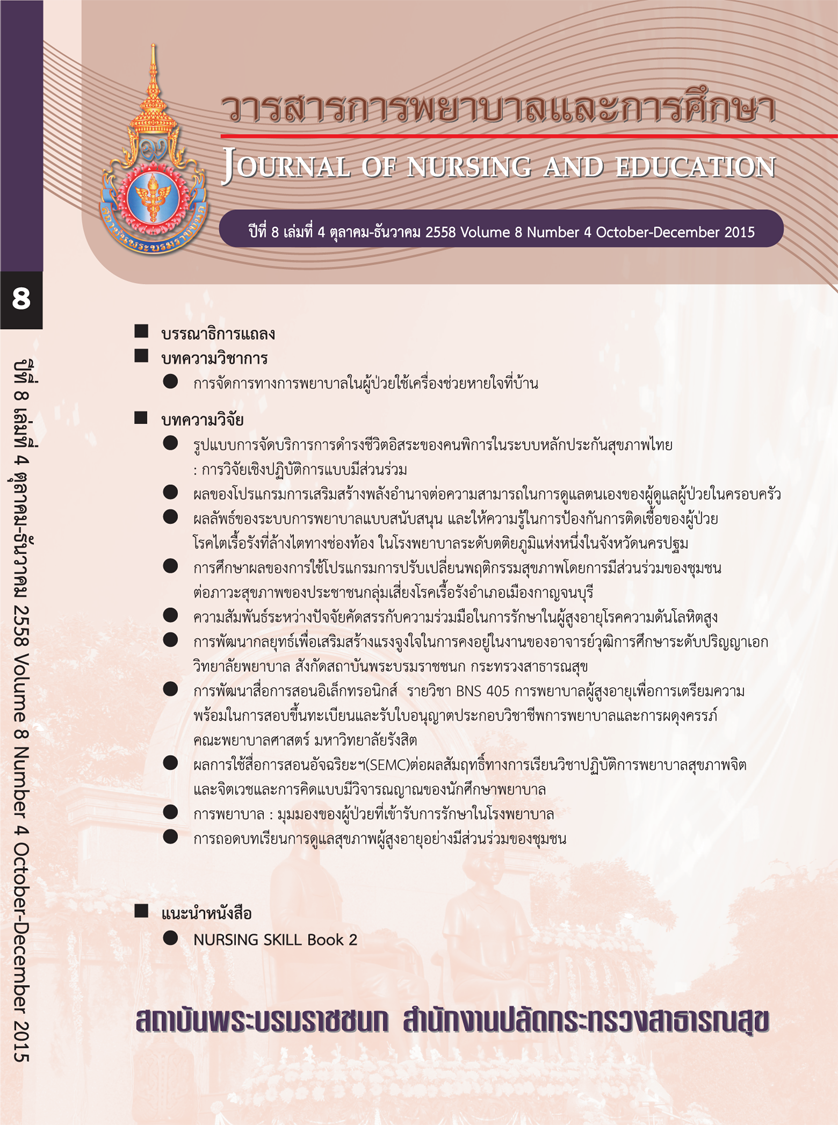ผลของโปรแกรมการเสริมสร้างพลังอำนาจต่อความสามารถในการดูแลตนเองของผู้ดูแลผู้ป่วยในครอบครัว; Effects of Empowerment program on Self-care Ability of a Family Caregiver
คำสำคัญ:
ผู้ดูแลผู้ป่วยในครอบครัว, การสร้างเสริมพลังอำนาจ, การดูแลตนเอง, Family caregiver, Empowerment, Self-careบทคัดย่อ
บทคัดย่อ
การวิจัยนี้เป็นการวิจัยกึ่งทดลอง (Quai-experimental research) แบบ one group pretest – posttest design มีวัตถุประสงค์เพื่อศึกษาผลของการใช้โปรแกรมเสริมสร้างพลังอำนาจต่อความสามารถในการดูแลตนเองของผู้ดูแลผู้ป่วยในครอบครัว โดยใช้แนวคิดการเสริมสร้างพลังอำนาจของ Gibson
กลุ่มตัวอย่างเป็นผู้ดูแลผู้ป่วยในครอบครัว ในเขตรับผิดชอบของโรงพยาบาลส่งเสริมสุขภาพตำบลวังอิทก อำเภอบางระกำ จังหวัดพิษณุโลก จำนวน 50 คน โปรแกรมเสริมสร้างพลังอำนาจประกอบด้วย
1) การค้นพบสภาพการณ์จริง 2) การสะท้อนคิดอย่างมีวิจารณญาณ (การตระหนักถึงคุณค่าในตนเองของผู้ดูแลผู้ป่วยในครอบครัว) 3) การตัดสินใจเลือกวิธีปฏิบัติที่เหมาะสมกับตนเอง และ 4) การคงไว้
ซึ่งการปฏิบัติอย่างมีประสิทธิภาพ ใช้ระยะเวลาดำเนินงานวิจัย 16 สัปดาห์ เครื่องมือที่ใช้ในการเก็บรวบรวมข้อมูลประกอบด้วย ข้อมูลทั่วไปและแบบประเมินความสามารถในการดูแลตนเองของผู้ดูแล
ผู้ป่วยในครอบครัว ซึ่งได้ผ่านการตรวจสอบความตรงตามเนื้อหาจากผู้ทรงคุณวุฒิ และนำไปทดลองใช้กับผู้ดูแลผู้ป่วยในครอบครัว จำนวน 30 คน มีค่าความเชื่อมั่นสัมประสิทธิ์แอลฟาของครอนบาช เท่ากับ .86 วิเคราะห์ข้อมูลโดยใช้สถิติบรรยาย ได้แก่ จำนวน ร้อยละ ค่าเฉลี่ย ส่วนเบี่ยงเบนมาตรฐาน และ paired t-test
ผลการวิจัยพบว่า ค่าเฉลี่ยความสามารถในการดูแลตนเองของผู้ดูแลผู้ป่วยในครอบครัว
รายด้านและโดยรวม หลังการเสริมสร้างพลังอำนาจสูงกว่าก่อนเข้าโปรแกรมอย่างมีนัยสำคัญทางสถิติ (t29= 42.17, p-value < .001) การเสริมสร้างพลังอำนาจ ทำให้ผู้ดูแลผู้ป่วยในครอบครัวมีความสามารถในการดูแลตนเองดีขึ้นทั้งด้านโภชนาการ ออกกำลังกาย สังคม จิตใจ จิตวิญญาณ และความรับผิดชอบต่อสุขภาพ ทั้งนี้จึงควรนำรูปแบบโปรแกรมการเสริมสร้างพลังอำนาจ มาพัฒนาแนวทางในการดูแลตนเองของผู้ดูแลผู้ป่วยในครอบครัวกลุ่มอื่นๆ เพื่อเพิ่มความสามารถในการดูแลตนเองโดยเน้นการค้นพบสถานการณ์ตามจริง การรับรู้คุณค่าและความสามารถในตัวเองเพื่อให้เกิดวิธีปฏิบัติที่เหมาะสม และมีความยั่งยืนที่จะปฏิบัติในการดูแลให้มีประสิทธิภาพต่อไป
คำสำคัญ : ผู้ดูแลผู้ป่วยในครอบครัว การสร้างเสริมพลังอำนาจ การดูแลตนเอง
Abstract
The purpose of this quasi - experimental research, one group pre - posttest design, was to determine the effects of empowerment program on family caregiver’s self-care ability. The sample group was 50 family caregivers, under the charge of the Wang-ie tok Health Promoting District Hospital, Bangrakram district, Phitsanulok province. The participants were participated in the empowerment program for sixteen weeks. The empowerment program included 4 stages: 1) discovering of the real situation, 2) reflecting critical thinking (Recognizing the self-esteem of caregivers in the family), 3) choosing suitable practice for oneself, and 4) maintaining of efficient practices. Family caregiver’s self-care questionnaire to measure self-care ability was developed and validated by panel of expert.
The reliability of family caregiver’s self-care questionnaire was accepted with Conbach’s alpha of .86. Data were analyzed using descriptive statistics and paired t-test.
The results showed that the posttest mean score of family caregivers’ self-care ability was significantly higher than the pretest by each aspect and overall (t29 = 42.17, p-value < .001). The empowerment program led to improvement in family caregiver’s ability in better self-care such as nutrition, exercise, social, mental, spiritual and health responsibility. Therefore, this empowerment program should be applied to develop guidelines for family caregiver’s self-care promotion, to enhance family caregiver’s self-care ability by focusing on the discovery of the real situation, perceived self-esteem and their ability to achieve proper practices and sustainable practices that will ensure further self-care efficiency.
Keywords : Family caregiver, Empowerment, Self-care






